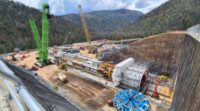Like other European construction firms, Switzerland’s largest contractor, Implenia A.G., suffered sales and profit drops in this year’s first half because of the COVID-19 pandemic.
However, gains from its spin-off in June of half of its real estate portfolio resulted in a 39% rise in the contractor’s earnings before interest, taxes, earnings before interest, taxes, depreciation, and amortization (EBITDA) to $111.6 million.
The crisis cut the company’s half-year sales by 11.8% to $2.1 billion, reducing EBITDA by $40.6 million but because of the real estate deal, which created a new stock exchange listed company called Ina Invest, Implenia’s development unit recorded a 279% EBITDA hike to $114 million.
Implenia’s civil engineering division was the hardest hit by the pandemic recording a 17.2% sales drop to about $1 billion and an EBITDA margin drop from 1.6% last year to -1.7%. Implenia's building unit sales fell 9.1% to $1.1 billion, with the EBITDA margin falling from 1.9% to 1.1%.
SNC Lavalin
Even with its push to exit turnkey construction to focus on higher-margin engineering work, Montreal-based SNC-Lavalin Inc. reported second-quarter results that were still “below expectations,” despite a major bump up from a year earlier, CEO Ian Edwards acknowledged July 30.
Edwards pointed to an economic downturn pushed by the pandemic and falling oil prices that halted its construction and resources development projects. The firm reported it lost $84.5 million in the quarter, noting impact from still remaining fixed-price work and restructuring charges in shrinking locations and staffing in its energy and resources businesses.
Those projects and the restructuring will finish by year-end, with the firm expecting to be profitable next year.
Revenue fell 14.5% to $1.48 billion from $1.73 billion in the same quarter of 2019.
Toronto industry analyst Maxim Sytchev of National Bank Financial said the firm’s engineering, nuclear and infrastructure services “are showing resilience through good execution and stable backlog” through 2020 and beyond. “There is value, but it is a grind,” he said in an investor report.






Post a comment to this article
Report Abusive Comment